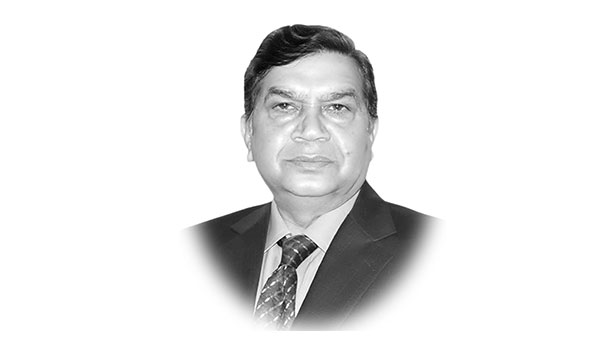Role of national institutions in resolving current crisis
I retired from the Army in July 2009, after donning military uniform for 31 years. During service in the Army, I had the opportunity to serve with at least three generations of military officers as their instructor, colleague, subordinate and senior, including the incumbent COAS, who was my student during training at the Pakistan Military Academy.
In addition to General Qamar Javed Bajwa, I had the opportunity to serve with four other Army Chiefs, including General Asif Nawaz, General Pervez Musharraf, General Ashfaq Pervaiz Kayani and General Raheel Sharif, as a subordinate or a colleague.
The 4th generation of the Army officers, I didn’t have a chance to serve with, includes my students at the Military College Jhelum, who are currently serving on important appointments as senior officers.
Besides serving in the Army myself, I have close to 10 family members, including my son, son-in-law, nephews, brother-in-law, etc, who have the honour of serving in the Army.
I also belong to the middle class that once used to be the natural ally of the Pak Army. They, in fact, hero worshipped the soldiers and officers of the Pak Army before the removal of Nawaz Sharif in a coup d’état staged on the orders of the then COAS, General Pervaiz Musharraf.
Military action in Balochistan coupled with the support to the USA War on Terrorism (against the Afghan Pashtun) after 9/11, further strengthen the anti-Pakistan and anti-Army nationalist movements in Balochistan and Pashtun areas bordering with Afghanistan.
Prior to the alienation of the people from the Army belonging to middle class, especially from the province of the Punjab, Balochistan and the erstwhile Federally Administered Tribal Areas of KP, the military takeovers in 1958, 1977 served to estrange the people of the erstwhile East Pakistan and interior Sindh, respectively, while military action in Karachi in 1992 caused serious damage to the mutual trust between the military establishment and Urdu Speaking community of urban Sindh, which once venerated the defence forces like the people of the Punjab.
After retirement from the Army, I have been writing columns and posts about the national and international affairs as well as subjects of general interest in newspapers and social media.
In my political columns and posts, Nawaz Sharif has been the target of my criticism and personal attacks because of his anti-Army tirade after the removal of his government on October 12, 1999.
My reaction to the anti-Army narrative of Nawaz Sharif and other leaders of PML(N) like Maryam Nawaz, Khawaja Asif, Pervaiz Rashid, etc. , was quite natural because of my attachment with the Pak Army and my family background.
Today, I was pained and alarmed to see countless number of posts on social media in which the Army and its Chief had been made the target of personal attacks and accusations by the supporters of Imran Khan, for reportedly their role in destabilizing the PTI government.
The military establishment remained under the pinching criticism by PML(N), PPP, JUI(F) and other opposition parties for allegedly bringing Imran Khan in power after removing Nawaz Sharif as the Prime Minister, prematurely.
Now PTI, which is considered the most powerful political force and the only political party that has its base in all parts of the country, has also joined other political parties and forces in castigating the military establishment for meddling in the political affairs of the country.
The top brass of defence institutions is well aware that no military force cannot defend the country from internal and external threats unless it enjoys the support of the people.
Unfortunately, current civil-military relationships are far from being enviable. Only option available to the security institutions at this moment is to immediately disengage themselves from the political affairs, without compromising on vital national security issues.
The known anti-state and anti-Army groups, having links with the intelligence agencies of the unfriendly countries, must not be allowed to use political platform to achieve their goals.
To weed out such groups from political scene effective legal actions be initiated instead of meddling in the political affairs of the country.
The Supreme Court of Pakistan has even more important role to ensure the continuation of the democratic process by cleansing the political system of undesirable practices.
To achieve this objective, the proven cases of “lack of integrity”, must be indiscriminately debarred from taking part in political activities by ensuring that eligibility criteria, for the members of parliament, as given in the Constitution of Pakistan is strictly applied by the Election Commission of Pakistan.
If the Election Commission is mandated by the Supreme Court to disqualify the members of parliament for life from holding a public office, who have been repeatedly derailing the democratic process by changing their loyalties for personal gains, it will do lots of good to the political system and the State of Pakistan.
The Supreme Court may also consider constituting JITs to investigate mega corruption scandals and cases against the politicians, after disbanding NAB, which has become a controversial government department due to its discriminatory dealings with the political parties and their leadership.
The proposed JITs, mandated to complete investigation of a case within a period of maximum 4 to 6 months, should account to the Supreme Court only, which may appoint a judge to supervise the functioning of JITs.
—The writer is contributing columnist, based in Islamabad.










